News
Is This the Most Pivotal NATO Summit Since the Cold War?

As tensions soar following the United States’ direct strikes on Iran’s nuclear sites, global attention is now turning to the Netherlands, where U.S. President Donald Trump is expected to attend a high-stakes NATO summit on Tuesday. This will be Trump’s first NATO gathering since winning re-election, and anticipation is high—not just for his arrival, but for what the summit might mean for the alliance’s future.
Trump has long criticized NATO allies for depending too heavily on U.S. military support. Now, with growing global instability and a revived American administration that’s more unpredictable than ever, European leaders are scrambling to reassure Washington of their commitment—and to ensure that the U.S. doesn’t scale back its presence in Europe.
“There were moments just weeks ago when we weren’t sure if he’d even show up,” one senior European diplomat admitted. “With Russia and China watching closely for signs of division, that kind of uncertainty could’ve been disastrous.”
In fact, the summit has been carefully designed to appeal to Trump. NATO Secretary General Mark Rutte has centered the agenda around a bold promise: European members will increase their defense spending to 5% of GDP by 2035—up from the longstanding 2% target.
The hope is to convince Trump that Europe is finally serious about its own security, and to avoid confrontations by keeping the discussions narrowly focused on financial contributions.
However, those plans now hang in the balance. Iran has retaliated against the U.S. strikes by launching missiles at American bases in Qatar and Iraq.
The crisis in the Middle East could keep Trump in Washington—or, if he does attend, force the summit’s focus to shift. That risks diplomatic clashes, especially as many European leaders preferred a diplomatic resolution to the Iran issue, rather than military escalation.
Trump has already been promised a symbolic victory. The new defense spending target was meant to showcase European compliance with his demands. “This summit is about credibility,” said U.S. Ambassador to NATO Matthew Whitaker.
Yet even this success is showing cracks. Spain claimed it secured an exemption from the 5% pledge, though Rutte denied that. Other countries are also pushing back, facing tight budgets and mounting political pressure at home.
Still, the underlying reality remains: Europe cannot afford to alienate the U.S.—the alliance’s nuclear and military backbone. That pressure helped Rutte bring most European leaders (except Spain) on board with the spending deal. But even then, former U.S. NATO Ambassador Julianne Smith cautions that “with Trump, nothing is guaranteed.”
There are deeper concerns, too. It’s unclear whether the U.S. will endorse a summit statement naming Russia as NATO’s primary threat. Trump’s conciliatory tone toward Moscow and his coercive approach to Ukraine have already eroded European confidence in the U.S. as a steadfast ally.
Tensions escalated further on Friday night when Trump defended the 5% spending target but insisted that the U.S. wouldn’t need to meet it: “I don’t think we should—but I think they should. We’ve been supporting NATO so long…”
While blunt, Trump’s stance isn’t unique. Past presidents, including Barack Obama, signaled a pivot away from Europe toward strategic concerns in the Indo-Pacific. What makes Trump different is his unpredictability and blunt transactional style.
The U.S. currently has about 100,000 troops stationed across Europe, including 20,000 in NATO’s eastern flank—deployments ordered after Russia’s full-scale invasion of Ukraine. But these numbers may not last. U.S. defense officials are reviewing troop levels and budgets, and many expect cuts later this year. Ukraine may also lose U.S. financial support, adding to regional uncertainty.
Despite all this, some NATO members like Poland remain optimistic. Spending 4.7% of its GDP on defense—more than any other NATO country—Poland aims to build Europe’s most formidable land force. For Warsaw, which borders Ukraine and remembers life under Soviet domination, defense is non-negotiable.
Elsewhere in Europe, the situation is more fragile. In Spain, debates over military spending have ignited political tensions and threatened the stability of the ruling coalition.
To ease the financial strain, NATO has proposed splitting the 5% pledge into two parts: 3.5% for direct military spending, and 1.5% for defense-related infrastructure, such as cyber defense or expanded seaports.
This model also aligns NATO’s targets more closely with U.S. spending levels, offering a psychological win without matching the U.S. dollar-for-dollar.
But the reality remains: funding this buildup will require painful trade-offs. Countries may need to raise taxes, increase borrowing, or cut public services. Estonia has experimented with new taxes, while Italy—burdened by debt—may face steep borrowing costs.
The UK, in its recent Strategic Defence Review, acknowledged the need for more military investment but stopped short of preparing its public for the sacrifices required.
The timing is also crucial. NATO wants the 5% target met within 7 to 10 years, but Secretary General Rutte has warned that may be too slow. With Russia’s war economy in full swing, he believes Moscow could strike a NATO member within five years.
Still, defense spending alone won’t solve the problem. European forces suffer from inefficiencies and duplication—178 different weapons systems and 17 tank models across the EU, for instance.
Pooling resources would increase efficiency, but national pride and domestic defense contracts make such cooperation politically sensitive and unlikely to be resolved at this summit.
So what can we expect?
That depends largely on whether Trump shows up—and how he decides to engage. His ambassador believes this could be a defining moment.
“A watershed,” one senior official called it—possibly the most consequential NATO summit since the Cold War. The moment Europe begins to match the U.S. on defense—and finally starts to take full responsibility for its own security.
….
Kenya Rocked by Deadly Protests Over Economic Hardship
At least eight people have been confirmed dead in Kenya following widespread protests against soaring living costs, unemployment, and alleged government corruption.
The unrest has escalated into violent clashes between demonstrators and security forces, with eyewitnesses reporting chaotic scenes as police deployed tear gas and live ammunition to disperse crowds in major cities.
The protests reflect public outrage over inflation that has rendered basic commodities unaffordable.
Demonstrators accuse the government of failing to provide relief or accountability, particularly in light of persistent allegations of corruption and mismanagement.
Hospitals in affected areas have been overwhelmed with casualties, including both protesters and security personnel.
The Kenyan government has condemned the violence and urged citizens to exercise their rights peacefully.
Authorities have promised investigations into the fatalities, but many remain skeptical about whether justice will be served. Human rights organizations have decrying what they describe as excessive force by law enforcement.
Many fear that without meaningful engagement and structural reform, the unrest may continue.
The situation continues to unfold, with many calling for transparency, accountability, and a commitment to upholding civil rights.
News
CARICOM Hails Peaceful, Credible Conduct of Saint Lucia General Elections

CARICOM Hails Peaceful, Credible Conduct of Saint Lucia General Elections
The Caribbean Community (CARICOM) has praised the peaceful and transparent conduct of Saint Lucia’s 1 December 2025 General Elections, following the deployment of an 11-member Election Observation Mission (CEOM) invited by the government of the island nation.
Led by Chief of Mission, Ian S. Hughes, the team, drawn from nine CARICOM member states including Antigua and Barbuda, The Bahamas, Barbados, Dominica, Grenada, Guyana, Jamaica, Suriname and Trinidad & Tobago arrived in Saint Lucia between 25 and 27 November.
Two officials from the CARICOM Secretariat provided administrative support.
In the days leading up to the vote, the Mission held extensive consultations with key political actors, including Prime Minister Philip J. Pierre of the Saint Lucia Labour Party (SLP), Leader of the Opposition Allen Chastanet of the United Workers Party (UWP), independent candidate Stephenson King, and Commissioner of Police Vern Garde.
The observers also engaged with civil society groups, business leaders, persons with disabilities, and the Saint Lucia Electoral Commission, in a bid to assess the political climate and level of preparedness for the elections.
CARICOM noted that while the campaign period was intense—characterised by fierce debates, policy-focused messaging, and occasional personal attacks—it remained largely peaceful, with no reports of election-related violence.
During the advance poll held on 28 November, the Mission observed long queues and delays caused by the limited number of polling centres available to early voters.
Despite the challenge, all eligible voters in line at the close of polls were able to cast their ballot, ensuring no disenfranchisement.
On Election Day, the CEOM covered 317 polling stations across 14 of the country’s 17 constituencies.
Observers reported orderly openings at 6:30 a.m., with adequate police presence, timely delivery of election materials, and the attendance of political agents from major parties.
Voters were said to have turned out early and in high spirits, contributing to a steady turnout throughout the day.
The Mission described polling officials as well-trained, professional and impartial, noting their courteous assistance to elderly and incapacitated voters.
While some polling stations located on upper floors created accessibility challenges, the process generally proceeded smoothly.
However, electronic data clerks struggled with severe connectivity issues that persisted for most of the day.
The CEOM confirmed that voting, closing and counting procedures were carried out strictly in line with Saint Lucia’s electoral guidelines.
Ballot counting was conducted transparently in the presence of political agents and observers, and results were properly recorded on Statements of Poll before being transported for the official tally scheduled for 2 December.
Overall, CARICOM expressed satisfaction with the conduct of the polls, commending polling staff, political party agents and the police for maintaining order and professionalism.
“It is the Mission’s considered view that the results of the General Election will reflect the will of the people of Saint Lucia,” the CEOM stated, urging citizens to remain calm and patient as they await the official results.
The Mission, which departs Saint Lucia on Wednesday, reaffirmed CARICOM’s commitment to supporting the country’s democratic process.
A final report detailing observations and recommendations is expected to be submitted to the CARICOM Secretary-General, Dr. Carla Barnett, in the coming weeks.
News
Macron Seeks Global Support for Nigeria Amid Rising Insecurity

Macron Seeks Global Support for Nigeria Amid Rising Insecurity
French President Emmanuel Macron has urged the international community to intensify support for Nigeria as the country battles worsening insecurity, particularly in the northern region.
Nigeria has witnessed a surge in deadly attacks and mass abductions in recent months.
In November, armed bandits kidnapped at least 200 pupils and teachers from St. Mary’s Catholic School in Papiri, Agwara Local Government Area of Niger State, drawing widespread condemnation.
Macron, in a statement after speaking with President Bola Ahmed Tinubu, expressed France’s solidarity with Nigeria and pledged stronger cooperation to address the security crisis.
He revealed that France would boost its partnership with Nigerian authorities and extend more support to affected communities.
“I conveyed France’s solidarity in the face of the various security challenges, particularly the terrorist threat in the North,” Macron said.
“At his request, we will strengthen our partnership with the authorities and our support for the affected populations. We call on all our partners to step up their engagement. No one can remain a spectator.”
News
Russia Welcomes Trump’s New Security Strategy, Says It Aligns With Moscow’s Vision
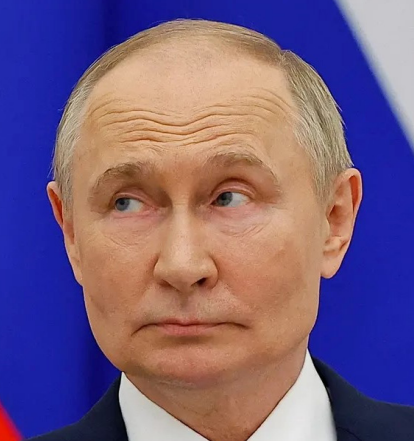
Russia Welcomes Trump’s New Security Strategy, Says It Aligns With Moscow’s Vision
Russia has hailed President Donald Trump’s newly released National Security Strategy, describing the document as “largely consistent” with Moscow’s own worldview.
Kremlin spokesperson Dmitry Peskov, speaking in an interview published by state news agency Tass on Sunday, said the adjustments in the 33-page strategy marked “a positive step,” though he noted that Russia would continue to study the document closely before making firm conclusions.
The strategy, unveiled by the US administration earlier in the week, adopts markedly softer language toward Russia and does not portray Moscow as a threat.
Instead, it frames Europe as facing what it calls “civilisational erasure,” while outlining priorities such as curbing foreign influence, restricting mass migration, and countering what it describes as censorship within the EU.
The document has drawn strong criticism across Europe, with several EU officials and analysts accusing Washington of echoing Kremlin rhetoric and undermining long-standing transatlantic positions on democracy and security.
The report argues that the US must “re-establish strategic stability to Russia” to stabilise European economies and appears to support political movements opposed to Europe’s current trajectory.
German Foreign Minister Johann Wadephul cautioned that issues of freedom of expression “do not belong” in a security strategy, while Polish Prime Minister Donald Tusk reminded Washington that “Europe is your closest ally, not your problem.”
Former Swedish Prime Minister Carl Bildt described the document as placing itself “to the right of the extreme right.”
The strategy also promotes a revived “Western identity” and praises “patriotic European parties,” raising concerns about US alignment with far-right groups, including Germany’s AfD, which domestic intelligence classifies as extreme right.
Beyond Europe, the strategy signals potential military actions against alleged drug-trafficking vessels in the Caribbean and eastern Pacific, and calls for increased defence spending from Japan, South Korea, Australia, and Taiwan.
In Washington, Democrats warned that the new posture threatens decades of US foreign policy. Representative Jason Crow labelled the strategy “catastrophic,” while Gregory Meeks said it abandons America’s traditional values-based global leadership.
-
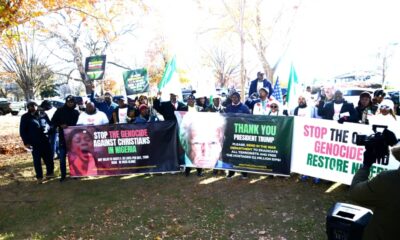
 Diaspora1 week ago
Diaspora1 week agoKillings in Nigeria: ‘Enough is Enough,’ SNG-USA Cries Out from U.S. Capitol
-
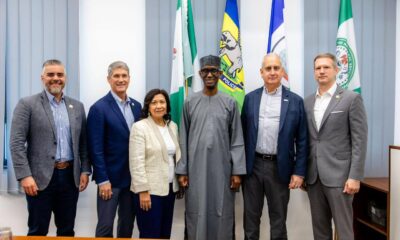
 News1 week ago
News1 week agoSecurity Concerns: Ribadu Hosts U.S. Congressional Delegation in Abuja
-
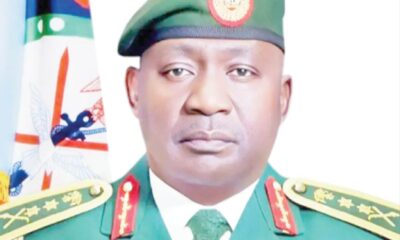
 Analysis1 week ago
Analysis1 week agoBeyond A Defence Minister, by Alabidun Shuaib AbdulRahman
-
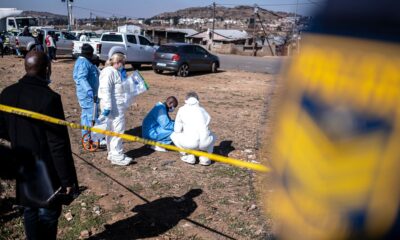
 Diaspora1 week ago
Diaspora1 week ago11 Killed, 14 Injured in Mass Shooting at South African Hostel
-

 Analysis1 week ago
Analysis1 week agoPerennial Coups in Africa, by Boniface Ihiasota
-

 News1 week ago
News1 week agoCARICOM Hails Peaceful, Credible Conduct of Saint Lucia General Elections























